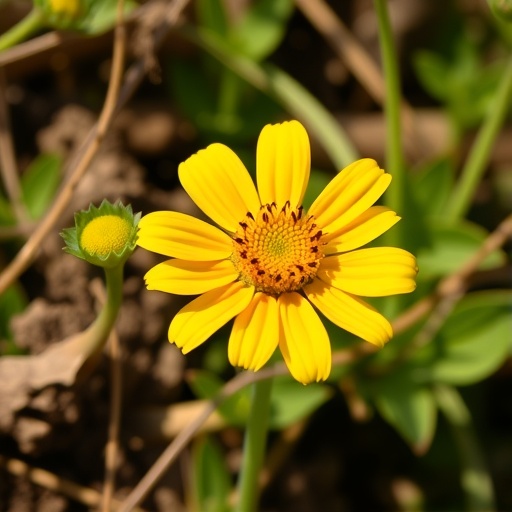In the complex interplay between climate change and biodiversity, few stories are as poignant as that of the Mediterranean mountain germination syndrome, a phenomenon vividly illustrated by the plight of the endemic plant Anthemis aetnensis. Found primarily on the slopes of Mount Etna in Italy, this unique flower faces multiple threats from changing environmental conditions and shifting land-use patterns. Recent research has shed light on how these factors influence the germination and survival of this rare species, offering critical insights not just for conservation efforts in the region, but also for broader discussions on ecological resilience.
The Mediterranean region is recognized for its rich biodiversity and distinct climatic conditions, characterized by hot, dry summers and mild, rainy winters. Within this unique ecosystem, endemic species play a crucial role in maintaining the ecological balance. However, as temperatures rise and precipitation patterns become increasingly erratic due to climate change, many of these native plants find their survival hanging in the balance. Anthemis aetnensis serves as a case study, highlighting the urgent need for a deeper understanding of how these environmental shifts are reshaping local flora.
Researchers have long noted that climate change precipitates earlier flowering and fruiting periods in various plant species, disrupting traditional symbiotic relationships with pollinators. In the case of Anthemis aetnensis, these changes could drastically alter its reproductive success rate. Implications on pollination dynamics could pose challenges not just to this particular species but to the interconnected web of life on which it relies. As flowering times become desynchronized, the potential for seed set diminishes, ultimately resulting in a decreased likelihood of persistence in the wild.
Additionally, land-cover changes brought about by human activity—such as agriculture, urbanization, and tourism—introduce further complications to the survival of Anthemis aetnensis. These activities often lead to habitat fragmentation, which isolates populations of plants, making it difficult for them to interbreed. The genetic diversity of the species diminishes, leading to a greater vulnerability against diseases and environmental stressors. Understanding the synergistic effects of climate and land-use changes is essential for developing effective conservation strategies.
The latest research highlights not only the threats faced by Anthemis aetnensis but also the resilience strategies that species can employ in response to these pressures. For instance, some plants have developed adaptive traits that allow them to retain moisture or reflect intense sunlight, enhancing their survival prospects even in the face of climatic adversity. These traits are critical in maintaining the plant’s life cycle and ensuring that it can continue to thrive in its mountainous habitat.
Moreover, scientists have begun to study the potential for assisted migration as a conservation strategy for endemic species like Anthemis aetnensis. By relocating plant populations to areas where climatic conditions will be more favorable, researchers hope to increase their chances of survival. Although this practice raises ethical questions around altering natural ecosystems, it presents a potential solution to the looming threats posed by climate change.
In examining the ecological implications of these adaptive strategies, it becomes clear that the fate of Anthemis aetnensis is intertwined with the broader health of Mediterranean ecosystems. The preservation of such endemic species is vital not only for maintaining biodiversity but also for safeguarding ecosystem functions. Healthy ecosystems provide services that benefit humans, including carbon sequestration, water retention, and soil stabilization, underscoring the critical connections between species conservation and human well-being.
Public awareness campaigns aimed at highlighting the plight of endemic species like Anthemis aetnensis are crucial. Educating the public about the intricate dynamics of their local ecosystems can inspire community action and foster greater support for conservation initiatives. Engaging local stakeholders, including farmers, policymakers, and conservationists, is instrumental in creating a sustainable future that recognizes the value of biodiversity.
The issue of climate resilience in Mediterranean mountain ecosystems extends beyond individual species. It reflects a broader anthropogenic impact on nature, emphasizing the need for global cooperation to mitigate climate change and promote sustainable land management practices. As scientists continue to unravel the connections between climate, land use, and plant dynamics, findings such as those concerning Anthemis aetnensis will be essential for informing policy-making and environmental restoration efforts.
In conclusion, the narrative of Anthemis aetnensis serves as a powerful reminder of the fragility of biodiversity in the face of rapid environmental changes. The research led by Bonanno and Veneziano is not merely an academic exercise; it highlights the urgent need for immediate action to protect endemic species and the ecosystems they inhabit. As we forge ahead in the 21st century, it is imperative that we balance human activities with the preservation of our planet’s natural heritage, ensuring that future generations inherit a world rich in biodiversity and ecological integrity.
The challenges faced by Anthemis aetnensis epitomize the larger crisis of biodiversity loss exacerbated by climate change. However, understanding these dynamics may pave the way toward effective conservation strategies, fostering resilience and adaptability among vulnerable species. As we engage with this critical issue, it becomes increasingly clear that our planet’s future hangs in the balance, shaped in part by our actions today.
Subject of Research: Mediterranean mountain germination syndrome, focusing on the plant Anthemis aetnensis.
Article Title: Mediterranean mountain germination syndrome: here the story of the endemic plant Anthemis aetnensis (Mt. Etna, Italy) facing climate and land-cover changes.
Article References:
Bonanno, G., Veneziano, V. Mediterranean mountain germination syndrome: here the story of the endemic plant Anthemis aetnensis (Mt. Etna, Italy) facing climate and land-cover changes.
Environ Monit Assess 197, 1174 (2025). https://doi.org/10.1007/s10661-025-14630-1
Image Credits: AI Generated
DOI: 10.1007/s10661-025-14630-1
Keywords: climate change, biodiversity, conservation, endemic species, Anthemis aetnensis, Mediterranean ecosystems, resilience, land use, pollination dynamics, habitat fragmentation.




